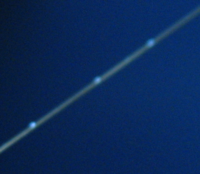Difference between revisions of "CLAS12R1 WireQualPic"
| Line 10: | Line 10: | ||
;The question becomes | ;The question becomes | ||
| − | :Do the wires | + | :Do the wires identified by the red circles above indicate a "kink" that was caused by the stringing? |
A suspected wire was carefully removed from the chamber to investigate. We were able to see the spot on the removed wire and we could feel a difference in the surface when move a gloved finger across the wire. | A suspected wire was carefully removed from the chamber to investigate. We were able to see the spot on the removed wire and we could feel a difference in the surface when move a gloved finger across the wire. | ||
Revision as of 19:30, 15 April 2013
An inspection of the wires strung in a drift chamber occurs at least weekly during construction. While the visual appearance of the wire is very sensitive to light and the observation angle, the stringing team observed some wires that differed in appearance to neighboring wires. The observation is a small spot that looks like a very small drop of water on the wire.

|
| The red circles indicate spots on the wire that are not visible on other wires |
The stringers would see similar spots on wire that was "kinked" during the stringing process.
- The question becomes
- Do the wires identified by the red circles above indicate a "kink" that was caused by the stringing?
A suspected wire was carefully removed from the chamber to investigate. We were able to see the spot on the removed wire and we could feel a difference in the surface when move a gloved finger across the wire.
We decided to look at wire that comes directly off the spool

|
| The picture above shows spots ("kinks") that are observed for wire taken directly off the wire spool. |
Our conclusion is that these spots are from the manufacturing process.